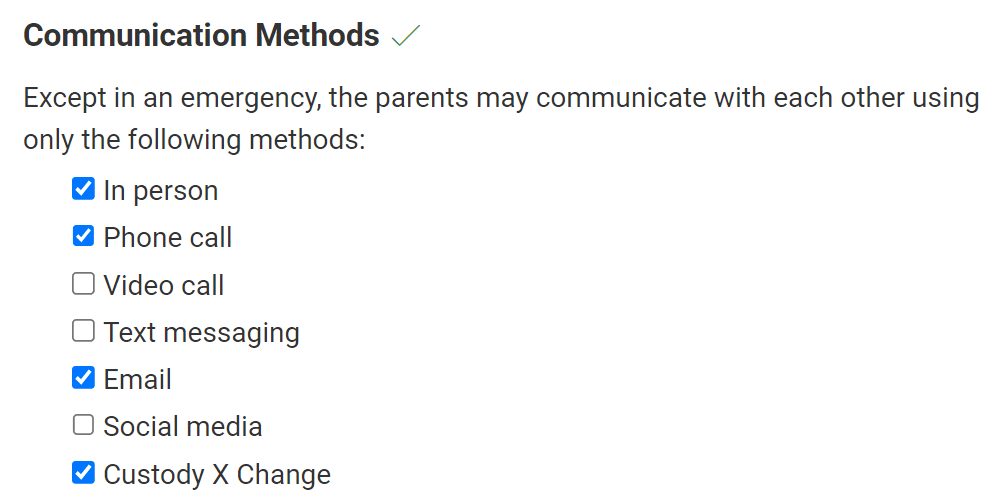Uncontested Cases & Settling in MO Custody: 3 Steps
When parents reach an agreement before starting the family court process, they file an uncontested case that asks the judge to turn their agreement into court orders.
By contrast, when a parent files a case without an agreement with the other parent, the case is contested. Then, the court process helps parents attempt to compromise so they can settle their case.
In uncontested cases and in contested cases that settle, parents together decide their parenting plan, residential schedule, child support arrangement and other issues (e.g., property division in a divorce). In other cases, a judge decides these issues in a trial.
Benefits of reaching an agreement
To avoid a contentious and expensive court battle, parents should ideally reach an agreement, either before or after filing a case. Other benefits to reaching an understanding include:
- Parenting plans are more specific to the child's and family's needs when decided by parents rather than a judge.
- Parents can use a flexible residential schedule, making agreed-upon changes without involving the court.
- The legal process is faster than going to trial (especially for uncontested cases).
- Parents generally collaborate more effectively afterward and have less conflict.
Steps to settling
Whether your case is uncontested or you reach a settlement after filing, follow the steps below to get your agreement turned into final orders.
1. Reach an agreement
Some parents are able to negotiate an agreement without any help. Afterward, they often hire an attorney together to complete and file their paperwork (called limited scope representation).
Of course, parents can always hire their own lawyers to represent them in negotiations (and to do paperwork). If you have a particularly complex case, consider collaborative law, in which a team of experts supports parents and their lawyers.
If you file a contested case, your court may require you to attend mediation, where an expert in dispute resolution and custody helps you compromise with the other parent. Only one session is required, but parents are encouraged to scheduling sessions until they reach a complete agreement.
Each county court has a domestic relations division that offers free mediation. Parents can also use the statewide custody mediation program. Both only mediate child custody issues — not divorce issues (e.g., property division).
Alternatively, parents can agree to hire a private mediator, either before or after filing a case. This allows them to choose a professional with scheduling flexibility and possibly expertise specific to their case (complex finances, LGBTQ families, etc.). Private mediators typically charge between $200 and $300 an hour, and parents share the cost.
2. Complete and file paperwork
If a mediator or attorney helps you reach an agreement, they'll also help you complete the required court paperwork.
Otherwise, you and the other parent must fill out the paperwork. You can use Custody X Change for step-by-step guidance on your parenting plan and residential schedule.

You can customize this to fit your situation with Custody X Change.
For uncontested cases, one parent opens the case and submits the agreement at the same time. Then the other parent files an answer saying they agree with everything. You can download the forms from Missouri's self-help website, but check whether your court has preferred versions.
For contested cases that settle, the parent who opened the case can submit the agreement to the court at any point in the litigation process. Contact your court for the required forms.
When you submit an agreement, you'll also schedule a final hearing.
3. Attend final hearing
Both parents must attend the final hearing. For divorces, it takes place at least 30 days after the case began.
The parent who schedules the hearing must serve the other parent notice about it, unless that parent has waived service. The court clerk can explain this process.
At the hearing, the judge reviews the agreement to make sure it meets legal requirements and the child's best interests. They also confirm that both parents agree. If all's well, the judge signs off to make the agreement into final orders.
After you've settled
The custody journey continues after you receive final orders. Now your responsibilities include:
- Following your residential schedule closely
- Communicating civilly about co-parenting
- Tracking child-related expenses if your parenting plan calls for splitting them
- Modifying your parenting plan if it becomes necessary
To do all of this and more, use Custody X Change.

You can customize this to fit your situation with Custody X Change.
The online app's customizable calendars, parent-to-parent messaging, expense tracker and parenting plan template will make life after settlement as straightforward as they made settlement itself.
